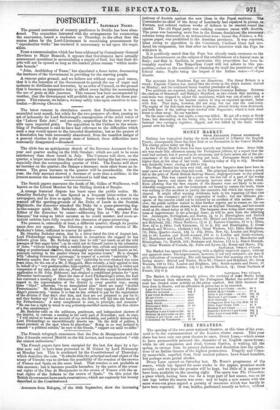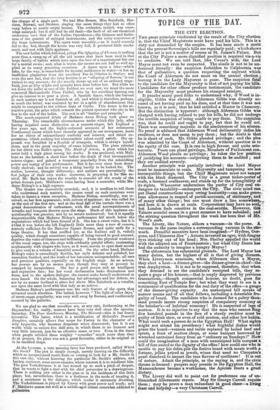THE THEATRES.
The opening of the two great national theatres, at this time of the year, used to be the commencement of the London winter season. This year there has been only one great theatre to open, Drury Lane,—which seems to have permanently assumed the character of an English opera-house; . while its old companion and rival, Covent Garden, is waiting_ till the spring, to emerge from its present darkness and desolation into the splen- dour of an Italian theatre of the highest pretensions. Tragedy and Come- dy meanwhile, expelled from their ancient palaces, have found humbler, but perhaps more genial abodes. Drury Lane opened on Saturday last. Mr. Bunn's programme of the season, which has figured for some weeks in the papers, promises much novelty; and we hope the promise will be kept, but little of it appears to have been available on the opening night. The opera was The Crusaders; a piece which, having been run for a large part of last season, was on its last legs before the season was over: and to begin a new season with the same worn-out piece argued a poverty of resources which was hardly to have been expected. It was, besides, performed exactly as before, without
the change of a single part. We had Miss Romer, Miss Rainforth, Har- rison, Borrani, and Stretton, singing the same things they had so often
sung before to nearly empty houses. The orchestra, indeed, was some- what enlarged; but it still had its old fault—the fault of all our theatrical orchestras save that of the Italian Operahouse—the thinness and feeble,- ness of the quartet of stringed instruments, and the noisy coarseness of the brass instruments. The opera went smoothly,--as it could scarcely fail to do; but, though the house was very full, it produced little excite- ment, and met with little applause.
The new ballet which followed, yclept The Offspring of Amer*, is nothing more than a vamp-up of all the old means that have been used in that large family of ballets which turn upon the love of a supernatural fair one fora mortal swain; and, what is worse, the means are not half so well ap- plied as on many preceding occasions. A dance upon a lake—which lake, by the way, is remarkable for its total unlikeness to water—is but an inefficieut plagiarism from the excellent Pas de l'Ombre in Ondine; and even the new fact, that the fairy heroine is an " offspring of flowers," is not turned to any account; for she merely shoots up out of an ordinary stage- bush, just as fifty sylphs and nymphs have done before her. But while we set down the ballet as one of the feeblest we ever saw, we must the more commend Mademoiselle Flora Fabbri, who by her excellent dancing can give an interest to so poor a piece. A Spanish dance, which the learned in such matters say is not Spanish at all, and which is therefore, perhaps, so much the better, was executed by her in a spirit of abandonment that might be compared to the wildest feats of Cerito. This dance is the at- tractive point, the prize which rewards the patient spectator who sits in his box to the end of the ballet. The rest is all "leather and prunella."
The much-expected debeit of Madame Anna Bishop took place on Thursday. The remarkable circumstances under which this lady, after having acquired some distinction as a concert-singer, left England a few years ago, and the highly-coloured accounts of her subsequent Continental career which have recently appeared in our newspapers, made her an object of extraordinary curiosity and interest, and raised ex- pectations which nothing but transcendent talent could satisfy. Her ap- proach was heralded by a flourish of trumpets, which is always injudi- cious, and in the great majority of cases injurious. The piece selected for her &That was Balfe's opera, The Maid of Artois; a piece which has never held a high place among his works. It was produced, with Mali- bran as the heroine, a short time before the death of that incomparable actress-singer; and gained a temporary popularity from the astonishing power and energy of her performance. But it has ever since been deser- vedly shelved; and its revival was a thing hardly to be looked for. The author, however, thought differently; and authors are proverbially the best judges of their own works: moreover, in preparing it fortis re- vival, Mr. Balfe has taken the trouble to remodel all the music of the prima donna's part; Malibran's voice having been a contralto, while Ma- claine Bishop's is a high soprano.
The theatre was excessively crowded; and, it is needless to tell those who understand such matters, the means usual on such occasions were taken to insure a warm reception. Madame Bishop, accordingly, was re- ceived, on her first appearance, with salvoes of applause; she was called for at the end of the first act; and at the final, fell of the curtain there was a grand demonstration of enthusiasm, with the usual accompaniments of wreaths and bouquets thrown upon the stage. Much of this applause un- questionably was genuine, and by no means undeserved; but it is equally unquestionable that Madame Bishop's performance fell much below the expectations which had been formed of it. She has a sweet voice, but it is (what it was before she left England) little more than a voce di camera, scarcely sufficient for the Hanover Square Rooms, and quite unfit for a large theatre. It has that muffled (or, as the Italians call it, veiled) quality, which though sometimes capable of being turned to good account, deprives the voice of clearness and brilliancy. From the physical weakness of the vocal organ, too, she sings with evidently painful effort; contrasting unpleasantly with singers who have, as it were, merely to open their mouth to give vent to a volume of beautiful sound. On the other hand, Madame Bishop's voice is exceedingly flexible, her style delicate and polished, her execution fiuished, and the truth of her intonation unimpeachable; all rare and precious qualities, especially on the English stage. As an actress, her powers are by no means great, though they may at present be cramped by inexperience. She has a good person and an intelligent and expressive face; but her vocal declamation lacks distinctness and force, and in the spoken dialogue she cannot make herself understood or even heard. On the whole, balancing her advantages and her defects, we are by no means inclined to place her above Miss Rainforth as a vocalist, nor upon the same level with that lady as an actress. Madame Bishop's performance was the only feature of the opera that attracted much attention. The ballad, however, " The light of other days," of street-organ popularity, was very well sung by Borrani, and vociferously encored by the galleries.



























 Previous page
Previous page